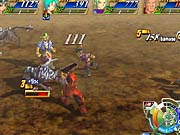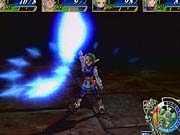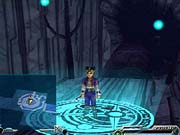Game Arts' Grandia Xtreme isn't so much a part of the Grandia role-playing game series as it is an offshoot. Xtreme spins off Grandia II's great battle system into a game that has more in common with action RPGs like Diablo than it does with its predecessors. There's a nominal storyline that follows the main character Evann as he is shanghaied into a military mission to stop elemental disorders. These four giant storms that have suddenly appeared over ancient ruins are causing trouble for nearby villages, and Evann and the usual hastily assembled party of characters who don't get along are required to put a stop to them by going directly to each ruin, fighting to the deepest portion, and returning directly home. Evann was picked for the mission because of his special ability to use geo gates, portals with fixed locations that all lead back home but, for barely justified reasons, can only be opened after you've fought your way to them. There's not much plot development, and more importantly, the gameplay has numerous shortcomings. The entire game seems undecided about what it wants to be, making the end result disappointing.

Grandia Xtreme has good points, chief among them the aforementioned combat system. Combat is based on initiative points (IP), which are represented on a circular gauge in the corner of the screen. The IP gauge adds a truly interesting tactical element to battles, something that is notoriously absent from most other RPGs. Icons representing the combatants move clockwise around the gauge until they reach a point where they can issue a command. This is where it gets interesting: There's an additional portion of the gauge after the command point that needs to be completed before the command can be executed. During this period, the combatant is vulnerable; there are certain types of attacks that will "cancel" the attack and cause the combatant's IP to drop far below the command point, effectively forcing the combatant to start over. Generally, the more powerful the attack, the longer it takes to prepare, therefore making it easier to cancel.

Canceling is a simple concept, yet it has a lot of depth because other factors come into play. Most canceling attacks require a melee attack, and everyone is constantly moving around the battlefield, so if you want to cancel an enemy attack you have to judge whether you can get there in time. Canceling attacks also do a lot less damage than normal attacks, and if the attack hits before the target's IP gauge has gone past the command point, the target's IP gauge is hardly knocked back at all. Furthermore, each character has a set of special skills, and some of these are ranged attacks that also have a canceling effect, but these attacks use up skill points that require recharging through using either normal attacks or items. It definitely makes boss battles more interesting as you try to keep the boss from charging up its most powerful attacks. Fans of Grandia II will also be pleased to know that some additions have been made, such as combined attacks that vary depending on whom you've selected for your party and bonuses for finishing a battle without anyone in your party getting hurt or for finishing a battle with one of a character's special skills.
If there's a flaw in the combat, it's that it's far too easy. Even most of the boss battles (which are too few and far between) are just long and drawn out but otherwise easy. The use of spells is rarely required, and instead, special skills dominate, especially since skills can be leveled up through use and magic can't.
Though magic is generally more powerful, that power just isn't needed. Characters get spells through equipping "mana eggs," which each contain a small set of spells. Characters can equip a preset number of eggs that more or less corresponds to how powerful they are with magic. Unlike in Grandia II, where eggs could be found in different places, getting the best eggs in Grandia Xtreme requires combining eggs two at a time, creating slightly more powerful eggs and in turn combining those, and so on. Different types of eggs combine better than others, but the game shows you what the result of a combination will be before you actually perform it, so it's easy to experiment. The only requirement for getting a really powerful egg is having lots of less powerful eggs, but they're in short supply. It's a good system and quite an improvement over Grandia II's, but the easy combat causes it to go mostly unused.

Character development, always important to an RPG, is also a bit raw in Grandia Xtreme. The characters in general are of good quality, with more good character designs by Kamui Fujiwara, but there's not a lot of plot in the game, so none of them really have a chance to develop. As in Grandia II, there are opportunities in the game to sit down and have a conversation over a meal; it's a great character-development device, but there aren't many chances to use it. The voice talent is also underused. Dean Cain supplies the voice of Evann, and Mark Hamill plays Kroitz, Evann's childhood rival. They both do a fine job, and the other characters are also voiced well. However, there are just not a whole lot of scenes with voice over, and many of the scenes that do have it are directed pretty poorly, with awkward pauses between line deliveries that disrupt the flow of the script. Voice is used far better in battle, where it's combined with some great battle music. There's a decent variety of sound bites for the various battle events that are done well enough to not get annoying after a lot of battles. Music outside of battle is just as good: It's very ambient, matching the mood of the locations and looping unobtrusively.

Thanks to the game's time-consuming and combat-heavy design, there is plenty of opportunity to enjoy the voice work and the music. Fans of Grandia II expecting a story-driven game will likely be disappointed. Grandia Xtreme is focused on being a dungeon crawl, but these dungeons, while certainly large, lack inspiration and sometimes aren't that impressive visually. Oddly, instead of being climactic and foreboding, large portions of the final dungeon are just a series of randomly generated levels, with the only gates out being five moderately sized levels apart. The bonus dungeon, which you can complete to get a second ending, is entirely random and incredulously large: 100 levels of little more than walls and monsters. Even if you're excited about the challenge of a 100-level dungeon, you might be put off by the fact that this one not only also has gates spread out every five levels, but these gates can only be used for a one-way trip. So as a best-case scenario, when you want to save you'll have to do five levels over again every time. You might be used to spending a lot of time with the game by then, though, because while none of the gates beforehand force you to lose your progress like that, gates are by far too rare throughout the game. You're often in a situation where if you want to quit playing for a while, you're at least half an hour from the next opportunity to gate and save.
In the end, it's hard to recommend Grandia Xtreme. As a pure dungeon crawl, it has a good enough story, but as an RPG, it doesn't. As an RPG, it has an involving combat system and good character design, but as a dungeon crawl, it has an unbalanced combat system and demanding time requirements. As a mix of the two, it's a game with bits of a world and bits of a story that somehow manages to come off as incomplete despite taking a very long time to finish.